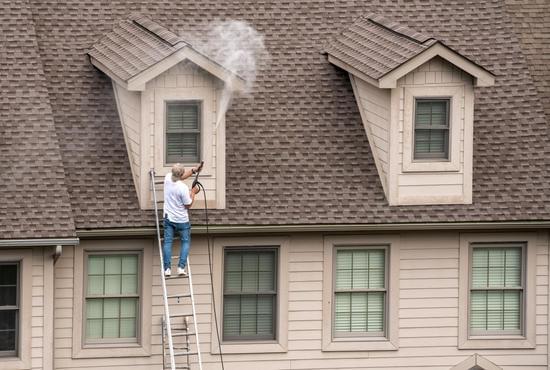The concept of home improvement has evolved over the years, with homeowners increasingly looking for ways to not only enhance the aesthetics and functionality of their properties but also to make environmentally conscious choices. One such innovation that is gaining popularity is the installation of solar systems. But is a solar system considered home improvement? In this article, we will delve into the topic of solar energy as a form of home improvement and its many benefits.
When it comes to the term “home improvement”, most people think of renovations or upgrades to interior spaces, landscaping, or infrastructure. However, in today’s world, the definition has expanded to include sustainable and eco-friendly solutions aimed at reducing energy consumption and carbon footprint. A solar system can be seen as a significant enhancement to a property that aligns with these modern principles.
In the following sections, we will explore what exactly a solar system is and how it works, as well as the various benefits associated with installing one in your home. From cost savings to decreased reliance on traditional energy sources, there are compelling reasons why more and more homeowners are considering solar energy as a valuable investment in their properties.
What Is a Solar System and How It Works
A solar system refers to the technology used to harness energy from the sun and convert it into electricity that can be used to power homes, businesses, and other structures. This is achieved through the use of photovoltaic (PV) panels, which are designed to absorb sunlight and convert it into a direct current (DC) of electricity.
These panels are made up of multiple solar cells, usually composed of silicon, that work together to create an electrical current when exposed to sunlight.
The process behind solar energy is relatively simple yet incredibly effective. When sunlight hits the solar panels, the photons in the light interact with the silicon atoms in the cells, causing electrons to be released. These free electrons then flow through the material within the panel, creating an electrical current that can be captured and converted into usable electricity for various applications.
The way a solar system works essentially allows property owners to generate their own clean energy from a renewable source – the sun. Not only does this reduce reliance on traditional sources like coal or natural gas, but it also provides an environmentally-friendly alternative that helps mitigate greenhouse gas emissions and combat climate change.
Furthermore, as technology continues to evolve in this field, solar systems have become more efficient and affordable than ever before, making them an attractive option for those looking to reduce their carbon footprint while saving money on utility bills.
- Photovoltaic (PV) panels absorb sunlight
- Solar cells made of silicon release electrons when interacting with sunlight
- Creates an electrical current for generating electricity
The Benefits of Installing a Solar System as a Form of Home Improvement
When it comes to home improvement, installing a solar system can offer significant benefits beyond just enhancing the appearance or functionality of your property. Here are some key advantages of incorporating a solar system into your home:
- Cost Savings: One of the most appealing aspects of installing a solar system is the potential for significant cost savings on energy bills. By harnessing the power of the sun, homeowners can reduce their reliance on traditional electricity sources, leading to lower monthly utility expenses.
- Environmental Impact: Utilizing solar energy significantly reduces carbon emissions and reliance on non-renewable resources, making it an environmentally friendly choice. By choosing solar power, homeowners can contribute to a healthier planet by decreasing their carbon footprint.
- Energy Independence: Solar systems provide homeowners with greater control over their energy production and consumption. With a solar system in place, homeowners can generate their own clean energy, reducing their dependence on external energy suppliers and fluctuating utility costs.
In addition to these benefits, the installation of a solar system aligns with the growing movement towards sustainability and renewable energy. As technology continues to advance and awareness about climate change grows, more people are recognizing the value of integrating solar power into their homes as an effective means of addressing environmental concerns while also reaping financial rewards.
The Process of Installing a Solar System
Assessment and Site Evaluation
The first step in the process of installing a solar system is conducting an assessment and site evaluation. This involves determining the suitability of your property for solar energy, including factors such as the amount of sunlight the area receives, potential shading from trees or buildings, and the structural integrity of your roof. An experienced solar installer will visit your property to assess these factors and provide recommendations for the best placement of solar panels.
Permitting and Interconnection
Once the assessment is complete and you have decided to move forward with installing a solar system, the next step is obtaining the necessary permits and interconnection agreements. This may involve securing building permits from your local government and obtaining approval from your utility company to connect your solar system to the electrical grid. The exact requirements for permitting and interconnection will vary depending on your location and specific circumstances.
Installation and Maintenance
After obtaining the necessary permits, interconnection agreements, and any applicable rebates or incentives, it’s time for the installation of your solar system. This typically involves mounting the solar panels on your roof or property, installing inverters to convert the sun’s energy into usable electricity, and connecting the system to your home’s electrical panel.
Once installation is complete, regular maintenance is important to ensure optimal performance of your solar system. This may include cleaning the panels, inspecting electrical components, and monitoring overall system performance.
As you can see, installing a solar system involves several key steps from assessment to maintenance. It’s important to work with a qualified professional throughout this process to ensure that everything is done correctly and efficiently. By understanding this process, homeowners can make informed decisions about whether a solar system is a suitable form of home improvement for their needs.
Financial Incentives and Rebates for Installing a Solar System
Understanding the Financial Incentives
When considering installing a solar system as a form of home improvement, it’s important to take into account the various financial incentives and rebates that are available. These incentives can significantly offset the initial cost of installation and make solar energy more accessible to homeowners.
Some common financial incentives include federal tax credits, state and local rebates, and solar renewable energy certificates (SRECs). By taking advantage of these incentives, homeowners can see a quicker return on their investment in solar energy.
Government Programs for Solar Energy
In addition to financial incentives, there are also various government programs aimed at supporting the adoption of solar energy. For example, the U.S. Department of Energy offers grants for residential and commercial solar projects through initiatives such as the SunShot Initiative.
Furthermore, many states have their own programs to promote renewable energy, including low-interest loans, property tax exemptions, and performance-based incentives. It’s important for homeowners to research these government programs in their area to fully understand the potential savings when installing a solar system.
Exploring Potential Savings
By taking advantage of financial incentives and government programs, homeowners can significantly reduce the upfront cost of installing a solar system. This can result in thousands of dollars in savings over time through reduced energy bills and potential income from selling excess energy back to the grid.
Additionally, as technology advances and economies of scale come into play, the overall cost of solar systems continues to decrease, making it an increasingly attractive option for those looking to improve their homes while saving money in the long run.
When considering home improvement options, it’s clear that installing a solar system comes with significant financial benefits that make it an appealing choice for homeowners looking to reduce their environmental impact while also saving money on their energy bills. By carefully researching available financial incentives and government programs, homeowners can make informed decisions about investing in solar energy for their homes.
The Impact of a Solar System on Property Value
When considering home improvement projects, one often thinks of renovations, landscaping, or kitchen upgrades. However, one valuable home improvement that is sometimes overlooked is the installation of a solar system. A solar system not only provides clean and renewable energy but can also significantly increase the resale value of a home.
According to research conducted by the U.S. Department of Energy’s Lawrence Berkeley National Laboratory, homes equipped with solar energy systems tend to sell for more than those without. The study found that on average, solar panels added about $4 per watt to a home’s resale value. This means that for an average-sized solar installation of 5 kilowatts, a homeowner could potentially add $20,000 in value to their property.
Furthermore, studies have shown that homes with solar panels not only sell for more money but also sell faster than those without. This is because potential buyers recognize the long-term cost savings and environmental benefits associated with owning a solar-powered home. As more people become environmentally conscious and seek ways to reduce their carbon footprint, the attractiveness of a solar-equipped home continues to grow.
| Research Data | Value |
|---|---|
| Average increase in resale value per watt | $4 |
| Increased value for an average-sized 5kW installation | $20,000 |
Common Misconceptions About Solar Systems as a Form of Home Improvement
There are several misconceptions and concerns that surround the idea of installing a solar system as a form of home improvement. One common misconception is that solar panels are only effective in sunny climates, which may lead homeowners in less sunny areas to believe they won’t benefit from solar energy. In reality, solar panels can still generate electricity on cloudy days, making them a viable option for homes in various climates.
Another misconception is the belief that the installation of solar panels is expensive and unaffordable for the average homeowner. However, with advancements in technology and government incentives, the cost of installing a solar system has significantly decreased over the years. Many homeowners also see a return on their investment through reduced energy bills and potential tax incentives or rebates.
Some individuals have expressed concerns about the aesthetics of solar panels and how they may impact the curb appeal of their homes. However, there are now various options for sleek and modern-looking solar panel designs that can enhance the overall look of a property while still harnessing renewable energy. Additionally, advancements in technology have allowed for more discreet installation methods, such as roof-integrated solar tiles.
Overall, it’s important to address these misconceptions surrounding solar systems as a form of home improvement to help homeowners make informed decisions about their energy needs. By debunking myths and addressing concerns, more individuals may be open to considering solar energy as a valuable addition to their homes.
| Misconception/Concern | Rebuttal |
|---|---|
| Solar panels only work in sunny climates | Solar panels can generate electricity on cloudy days |
| Installation cost is unaffordable | Advancements in technology and government incentives have reduced installation costs |
| Aesthetics and impact on curb appeal | Modern-looking designs and discreet installation methods are available |
Conclusion
In conclusion, installing a solar system can be considered a valuable investment in home improvement for a variety of reasons. Not only does it offer significant cost savings on energy bills, but it also reduces environmental impact and provides greater energy independence. The technology behind solar energy is constantly improving, making it an increasingly viable option for homeowners looking to upgrade their properties.
Furthermore, the process of installing a solar system is made more accessible through financial incentives and rebates offered by both government programs and utility companies. These incentives can significantly offset the initial installation costs and make the decision to go solar even more compelling. Additionally, the increase in property value that comes with having a solar system installed is another compelling reason to consider this form of home improvement.
Overall, despite common misconceptions about solar systems as a form of home improvement, the benefits far outweigh any concerns. It’s important for homeowners to educate themselves about the potential savings and positive impact on both their wallets and the environment. By considering all aspects of installing a solar system and taking advantage of available incentives, homeowners can make an informed decision about this valuable home improvement investment.
Frequently Asked Questions
Do Solar Panels Count as Home Improvements?
Solar panels can definitely be considered home improvements. By installing solar panels on a property, homeowners can increase the value and energy efficiency of their homes. This improvement not only benefits the environment but also adds to the overall appeal and functionality of a house.
Can You Write Off Solar Panels on Taxes?
Yes, it is possible to write off solar panels on taxes in certain situations. The federal government offers a tax credit for homeowners who install solar panels, which allows them to deduct a certain percentage of their installation costs from their federal taxes. Additionally, some states offer their own tax incentives or rebates for solar panel installation.
Are Solar Panels Related to the Construction of a House?
Solar panels are indeed related to the construction of a house, especially when they are integrated into the design and build process. While it’s certainly possible to add solar panels to an existing home, incorporating them during the initial construction phase can be more cost-effective and allows for seamless integration into the overall aesthetics of the property.
This pre-planning also ensures that the home is built with energy efficiency in mind from the start.

I’m thrilled to have you here as a part of the Remodeling Top community. This is where my journey as an architect and remodeling enthusiast intersects with your passion for transforming houses into dream homes.





